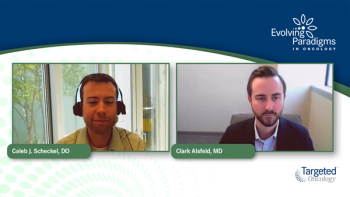
Future Developments With BTKi
Mazyar Shadman, MD, MPH, and Jonathon Cohen, MD, MS, discuss possible future developments with BTKi as therapy options in B-cell lymphomas.
Episodes in this series

Mazyar Shadman, MD, MPH: Where do you see the future in B-cell malignancies? We talked more about CLL [chronic lymphocytic leukemia] and mantle cell [lymphoma] because those are more common and maybe more critical in terms of the outcome. Do you think there will be any role for monotherapy with BTK [Bruton tyrosine kinase] inhibitors in the next 5 years?
Jonathon Cohen, MD, MS: It’s a good question. I’ve been disappointed in some of the outcomes evaluating combination therapies with ibrutinib, at least in mantle cell lymphoma. There’s no question that the combination, for example, of ibrutinib or venetoclax could be administered safely. There’s a high rate of MRD [minimal residual disease] negativity. At least to my own review of the data, I haven’t seen that necessarily translate into a marked difference in duration of response or progression-free survival [PFS]. That doesn’t mean that we may not see that over time or that there may not be a role for combinations, but I don’t envision ibrutinib and venetoclax or any of the BTK inhibitors and venetoclax being the standard in relapsed mantle cell lymphoma, at least based on the data we have. You can reduce remission. You can have somebody develop MRD negativity, but it doesn’t necessarily translate into a long-term remission. And we certainly haven’t seen data that would suggest that you can give both of those therapies and then stop them, at least in mantle cell.
In CLL, we have had some data in the frontline and relapsed settings that have identified a high rate of MRD negativity. It does seem that those are prolonged remissions, although to compare with single-agent BTK or BTK plus CD20, it’s probably going to take a long time because we know the remission duration for even single-agent BTK is quite long. In CLL I could see that potentially happening. I’d love to get to a point where we have a combination approach that results in a time-limited therapy.
The United States Intergroup is currently enrolling, or has recently concluded enrollment, to a trial that was designed to ask this exact question, in which patients were randomized to either obinutuzumab-ibrutinib or obinutuzumab-ibrutinib and venetoclax, with the triplet administered for 18 months. CLL is likely a disease where we may see that before we see it in mantle cell, at least based on the data that I’ve reviewed.
I don’t know if you feel differently. Have you seen other data that may have gotten you more excited, at least in mantle cell?
Mazyar Shadman, MD, MPH: I agree. In mantle cell, generally, as you mentioned, the duration of responses in mantle cell are not as great as what we see in CLL. Whenever we have a higher-risk disease—it could be a high-risk CLL or mantle cell—I’d like to see a study showing that a combination is better than a sequencing approach. Because if you have limited options, we need to learn how to give them. Are you giving your best options together and then you’re left with nothing as a backup? Absolutely. In mantle cell and even in CLL, we need to see randomized trials showing that the overall outcome with overall survival is improved, and there are many studies comparing triplet with BTK inhibitor and CD20 antibody with the 2 Intergroup studies. There are many more coming using other BTK inhibitors we have. Clearly, we are seeing great efficacy with the combination of venetoclax and ibrutinib for frontline and relapsed setting. And we may start using it in selected patients, but to make it a standard of care, we do need to see randomized data.
Jonathon Cohen, MD, MS: Yes, that’s the point that I often make to my patients: we don’t know that it’s any better to give you both together, as opposed to giving you 1 and then when you need it, coming in with the other 1. Those are the data that are currently lacking. If you can show that the combination is highly effective and you can discontinue therapy, and then down the road when somebody relapses you can go back in with a combination or with BTK monotherapy, that would be meaningful if you can show that you can buy a certain amount of time. But with the data available, I completely agree that I wouldn’t do that as a standard approach.
The last thing I would say is that we’ve talked a lot about some of the challenges. We’ve talked a lot about toxicities and learning where these all fit. It’s important to recognize that the positive impact that all these BTK inhibitors have had on the lives of patients and on patient outcomes. You talked at the very beginning about how in CLL we were using combination chemotherapy regimens that could be toxic and have short- and long-term toxicity issues. That’s what I would leave this conversation with: just how much these agents have changed the way we think about B-cell malignancies, how excited I am about the newer agents coming forward, and how they may move the needle and improve outcomes even further.
Mazyar Shadman, MD, MPH: This has been extremely informative. Thank you, Dr Cohen, for this insightful discussion. Thank you to our audience for watching this Targeted Oncology™ presentation on “Bruton Tyrosine Kinase in B-cell Malignancies: Advances in Targeted Therapy.” We hope you found this discussion to be useful and informative. Thank you.
Jonathon Cohen, MD, MS: Thank you.
This transcript has been edited for clarity.








































